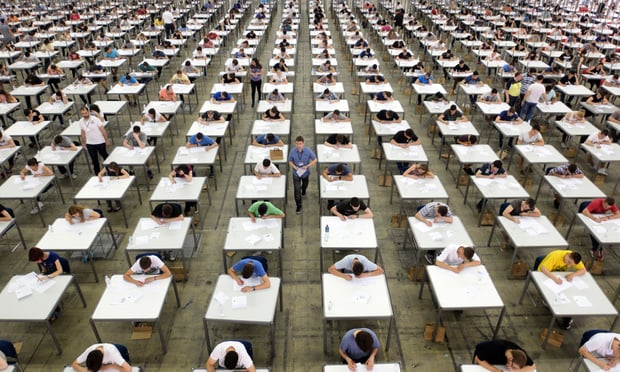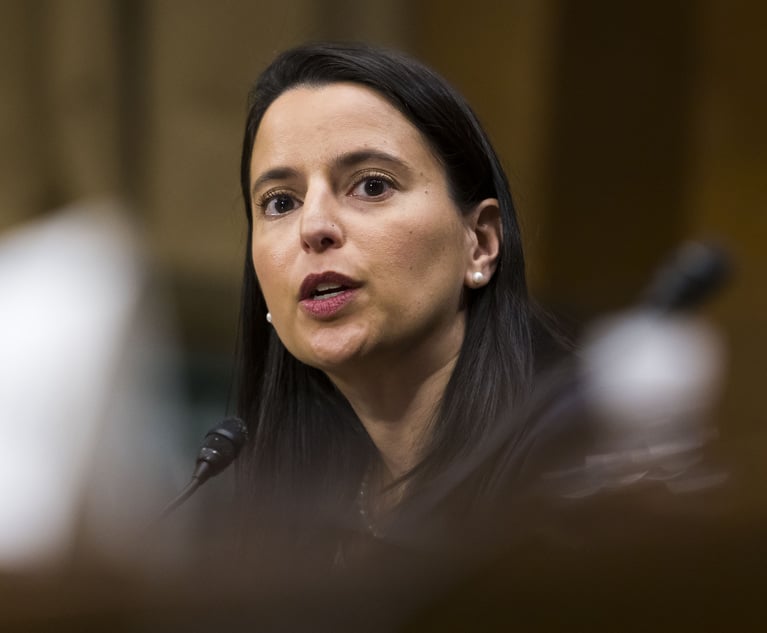Law Deans Ask California Justices to Provisionally License Students
The deans' request does not endorse a clean version of diploma privilege, which would allow recent graduates to practice law without passing the bar exam. But their support for a temporary licensing scheme would offer protections for some 2020 students.
April 20, 2020 at 07:10 PM
3 minute read
 Students in exaimination hall.
Students in exaimination hall.
Seventeen California law school deans have asked the state Supreme Court to create a provisional licensing program for applicants scheduled to take the July 2020 bar exam, a test now threatened with postponement or cancellation due to the novel coronavirus.
In a letter sent Friday via email, the deans of the American Bar Association-accredited schools urged the justices not to reschedule the two-day exam to Sept. 9 and 10, one of the recommendations the state bar's board of trustees made to the high court last week.
The deans said they are "very concerned" that ongoing public health concerns won't allow the exam to be conducted in traditionally large venues.
The court should consider administering the exam online as trustees also suggested, the deans continued. But the law school leaders added that an official with the National Conference of Bar Examiners told them that it's unlikely an online test can be developed and administered that quickly.
"We therefore urge that the court create a form of provisional licensing for those who were going to take the July 2020 bar exam," the deans wrote. "We favor that it be provisional licensing for a period of time long enough to permit our graduates some degree of flexibility and the ability to launch their careers, available for those who practice under the supervision of a licensed lawyer and who meet the other requirements for admission to the California bar."
The deans' request does not endorse a clean version of diploma privilege, which would allow recent graduates to practice law without passing the bar exam. But their support for a temporary licensing scheme would offer protections for some 2020 students eager to enter the workforce, to start paying off school loans and to avoid crowded testing sites.
The bar's trustees last week recommended that the California Supreme Court either delay the July exam to the fall or to cancel it all together. Trustees also suggested that if the court cancels the test it convenes a working group to consider some sort of provisional licensing.
The justices have given no indication publicly which options, if any, they favor. Court spokesperson Cathal Conneely said members will review the recommendations at their regularly scheduled conference on Wednesday and could take action before the end of the month.
Asked if the justices had spoken with deans, students or others with an interest in the July test, Connelly noted the hundreds of comments that have already been sent to the court, to trustees and to the committee of bar examiners.
Read more:
Postpone July Bar Exam or Cancel It, State Bar Tells Calif. Supreme Court
'Please Offer an Alternative Pathway': State Bar Gets Earful Amid COVID-19 Crisis
Pandemic Threatens to Upend Legislation on Court Construction, State Bar
California Is Pressed to Grant Diploma Privilege to Law Grads Amid Virus Crisis
This content has been archived. It is available through our partners, LexisNexis® and Bloomberg Law.
To view this content, please continue to their sites.
Not a Lexis Subscriber?
Subscribe Now
Not a Bloomberg Law Subscriber?
Subscribe Now
NOT FOR REPRINT
© 2025 ALM Global, LLC, All Rights Reserved. Request academic re-use from www.copyright.com. All other uses, submit a request to [email protected]. For more information visit Asset & Logo Licensing.
You Might Like
View All
Judge Accuses Trump of Constitutional End Run, Blocks Citizenship Order
3 minute read
Chicago Law Requiring Women, Minority Ownership Stake in Casinos Is Unconstitutional, New Suit Claims
5 minute read
Trending Stories
- 1Parties’ Reservation of Rights Defeats Attempt to Enforce Settlement in Principle
- 2ACC CLO Survey Waves Warning Flags for Boards
- 3States Accuse Trump of Thwarting Court's Funding Restoration Order
- 4Microsoft Becomes Latest Tech Company to Face Claims of Stealing Marketing Commissions From Influencers
- 5Coral Gables Attorney Busted for Stalking Lawyer
Who Got The Work
J. Brugh Lower of Gibbons has entered an appearance for industrial equipment supplier Devco Corporation in a pending trademark infringement lawsuit. The suit, accusing the defendant of selling knock-off Graco products, was filed Dec. 18 in New Jersey District Court by Rivkin Radler on behalf of Graco Inc. and Graco Minnesota. The case, assigned to U.S. District Judge Zahid N. Quraishi, is 3:24-cv-11294, Graco Inc. et al v. Devco Corporation.
Who Got The Work
Rebecca Maller-Stein and Kent A. Yalowitz of Arnold & Porter Kaye Scholer have entered their appearances for Hanaco Venture Capital and its executives, Lior Prosor and David Frankel, in a pending securities lawsuit. The action, filed on Dec. 24 in New York Southern District Court by Zell, Aron & Co. on behalf of Goldeneye Advisors, accuses the defendants of negligently and fraudulently managing the plaintiff's $1 million investment. The case, assigned to U.S. District Judge Vernon S. Broderick, is 1:24-cv-09918, Goldeneye Advisors, LLC v. Hanaco Venture Capital, Ltd. et al.
Who Got The Work
Attorneys from A&O Shearman has stepped in as defense counsel for Toronto-Dominion Bank and other defendants in a pending securities class action. The suit, filed Dec. 11 in New York Southern District Court by Bleichmar Fonti & Auld, accuses the defendants of concealing the bank's 'pervasive' deficiencies in regards to its compliance with the Bank Secrecy Act and the quality of its anti-money laundering controls. The case, assigned to U.S. District Judge Arun Subramanian, is 1:24-cv-09445, Gonzalez v. The Toronto-Dominion Bank et al.
Who Got The Work
Crown Castle International, a Pennsylvania company providing shared communications infrastructure, has turned to Luke D. Wolf of Gordon Rees Scully Mansukhani to fend off a pending breach-of-contract lawsuit. The court action, filed Nov. 25 in Michigan Eastern District Court by Hooper Hathaway PC on behalf of The Town Residences LLC, accuses Crown Castle of failing to transfer approximately $30,000 in utility payments from T-Mobile in breach of a roof-top lease and assignment agreement. The case, assigned to U.S. District Judge Susan K. Declercq, is 2:24-cv-13131, The Town Residences LLC v. T-Mobile US, Inc. et al.
Who Got The Work
Wilfred P. Coronato and Daniel M. Schwartz of McCarter & English have stepped in as defense counsel to Electrolux Home Products Inc. in a pending product liability lawsuit. The court action, filed Nov. 26 in New York Eastern District Court by Poulos Lopiccolo PC and Nagel Rice LLP on behalf of David Stern, alleges that the defendant's refrigerators’ drawers and shelving repeatedly break and fall apart within months after purchase. The case, assigned to U.S. District Judge Joan M. Azrack, is 2:24-cv-08204, Stern v. Electrolux Home Products, Inc.
Featured Firms
Law Offices of Gary Martin Hays & Associates, P.C.
(470) 294-1674
Law Offices of Mark E. Salomone
(857) 444-6468
Smith & Hassler
(713) 739-1250







